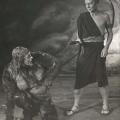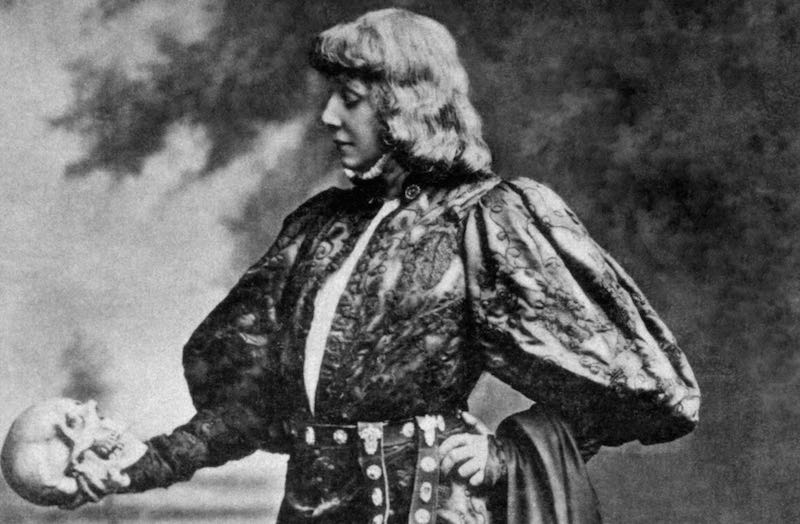426. A Face Without a Heart: Shakespeare’s Hamlet and Individualism
How the Renaissance turn towards individual identity is reflected in Shakespeare's most famous play.
Themes:
• D. Aers, “A Whisper in the Ear of Early Modernists,” in D. Aers, Culture and History, 1350-1600 : Essays on English Communities, Identities, and Writing (London: 1992), 177-202.
• G. Baldwin, “Individual and Self in the Late Renaissance,” Historical Journal 44 (2001), 341-64.
• C. Belsey, The Subject of Tragedy: Identity and Difference in the Renaissance (London: 2014).
• L.H. Craig, Philosophy and the Puzzles of Hamlet: a Study of Shakespeare’s Method (London: 2014).
• H. Grady, Shakespeare, Machiavelli, and Montaigne: Power and Subjectivity from Richard II to Hamlet (Oxford: 2002).
• S.J. Greenblatt, Renaissance Self-Fashioning from More to Shakespeare (Chicago: 1980).
• E. Hanson, Discovering the Subject in Renaissance England (Cambridge: 1998).
• P. Holbrook, Shakespeare’s Individualism (Cambridge: 2010).
• J.J. Martin, Myths of Renaissance Individualism (Houndsmills: 2004)
• K.E. Maus, Inwardness and Theater in the English Renaissance (Chicago: 1995).
• T. Zamir (ed.), Shakespeare’s Hamlet: Philosophical Perspectives (Oxford: 2018).







Comments
thank you
Thank you Peter for this wonderful podcast. I have been caught up for while, having listened to every episode. I look forward to the new ones every week (except when you are on break). Thanks again.
In reply to thank you by Joe Roccisano
Break
Unfortunately the break is just about to start, sorry about that! But thanks for being such a faithful listener, I'm so glad that you enjoy the series.
Antiquity and modernity
Contrariness is in my character, for better or worse, and I always feel disposed to give counterexamples to the idea that individualism is a product of the Renaissance and Protestantism solely. Protestantism differs in its emphasis from Roman Catholicism, and the latter, in important ways, theologically from its Jewish predecessor, which yet continues alongside it. The Confession in the High Holiday liturgy emphasizes repentance for sins both known and unknown; God searches the heart. This is mixed up with ritualism in a way that Protestantism is not, which is what I mean by the different emphasis of the latter, and the emergence of inwardness as a historical theme of modern times in particular. But no one man occasions historical change on a global scale (and indeed the whole world has come to benefit from Western technology and to use the Christian calendar as the civil one); rather, the world changes independently of us, and if we have agency, it is within a context given to us from without. If the inwardness characteristic of one aspect of Judaism has risen to prominence, that does not gainsay that its lineage extends back further than modern times alone; rather, it has been sifted out from the mass of Jewish teachings and ritual and highlighted by those who discerned its goodness. (Denunciations of the doctrine of sin as oppressive generally view freedom in terms of lawlessness, rather than self-governance.)
Similarly with the pervasive scholarly view that romantic love is of recent vintage; consider Isaac's weeping over Rebecca at the well, or Jacob's willingness to labor seven additional years for Rachel out of love for her.
Again, Adorno, in one passage, bemoans what he sees as a bourgeois, and so modern, division between work and private life, but the Talmud holds that a scholar should have a trade, the better, we may conjecture, to have his feet on the ground when ruling about what others need or need not do when interpreting the law.
I think there is much continuity to be forged between past and present that illuminates the latter, so that we see it less as separate from times we are liable to regard as benighted for want of the scientific progress of our own. Ecclesiastes had the jump on us: "there is nothing new under the sun."
In reply to Antiquity and modernity by Brad R
Individuality
Yes, indeed - these are the sorts of considerations given by the historians and medievalists I mention in the episode, who think that the claims about new trends towards individualism in the Reformation or Renaissance are overblown. I sort of think the truth is somewhere in the middle, that there was a new kind of individualism in this period, even if we can discern conceptions of the individual as such already in the medieval period. I mean, ultimately one has to admit that Hamlet couldn't have been written in 1400, and not just because Shakespeare hadn't been born yet!
In reply to Individuality by Peter Adamson
Individuality
Peter, no one writes "LOL" anymore, and it wasn't a belly laugh, but I did laugh at loud when I read your last line. Granted.
Self-creation
Seems to me they’re right who say Hamlet is somehow the invention of a certain idea of individualism (albeit it springs from Montaigne) but I wonder if that’s inadvertent. He certainly struggles with his role, but his redemption comes from ceasing to struggle and allowing providence to take over. The ‘revenge’ certainly doesn’t come about through his efforts or by virtue of his singular ‘character’. If anything, it comes about through the characters of Claudius and Laertes, who arranged the fight, poisoned the sword and cocked the whole thing up.
Hamlet's inner man and Luther
I wonder if in this play Shakespeare was testing out and messing around with Luther's idea of the inner man who is justified by faith and the outer man that is brought into line with it and so produces good works only then.
The scheme creates a sort of dualism in every individual and Hamlet, if I recall rightly had gone to study at a German Lutheran university? Perhaps Hamlet has been studying Lutheranism but is struggling to bring about conformity between his inner and outer man.
In reply to Hamlet's inner man and Luther by Xavier Young
Shakespeare and Luther
Nice point, especially about Hamlet’s studies. That could perhaps go along with the suggestion that he encountered, say, Epicureanism at university - the suggestion of the play in any case does seem to be that Hamlet represents a new type of young person who has been captured by ideas that could paralyze action.
Add new comment